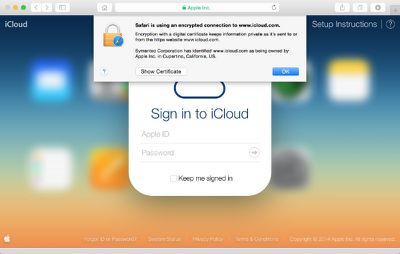Earlier this week, web censorship blog Great Fire suggested that hackers aligned with Chinese authorities were using man-in-the-middle attacks in order to harvest Apple ID information from Chinese users that visited Apple's iCloud.com website.
In a newly released support document (via The Wall Street Journal), Apple has confirmed that it is aware of the "intermittent organized network attacks" on iCloud users, but says that its own servers have not been compromised.
Apple is deeply committed to protecting our customers' privacy and security. We're aware of intermittent organized network attacks using insecure certificates to obtain user information, and we take this very seriously. These attacks don't compromise iCloud servers, and they don't impact iCloud sign in on iOS devices or Macs running OS X Yosemite using the Safari browser.
Apple's support document goes on to stress the importance of digital certificates, suggesting that users who see an invalid certificate warning in their browser while visiting iCloud.com should not proceed. The company also outlines how users can verify that their browser is connected to iCloud.com and not a third-party man-in-the-middle website.

Apple asks users to make sure that a green lock icon is visible in Safari and that the message "Safari is using an encrypted connection to www.icloud.com" is displayed when the lock icon is clicked. Apple also has verification instructions for both Chrome and Firefox.
Unfortunately, many of the victims falling prey to the fake iCloud sites are not using secure browsers that issue warnings when fake websites are visited. According to Great Fire, many Chinese users access the Internet through popular Chinese browser Qihoo, which does not let users know that a fake site is harvesting their information.
The attack works by redirecting Chinese users attempting to access iCloud.com to a fake website that resembles the iCloud website. Users that log into the fake site provide attackers with logins and passwords that can be used to access contacts, messages, photos, and documents stored within iCloud.
Though Great Fire has suggested that Chinese authorities may be involved in the attacks, a spokeswoman for China's Foreign Ministry (via CNBC) said that Beijing was "resolutely opposed" to hacking.
Chinese users should switch to a trusted browser like Firefox or Chrome to avoid falling prey to the fake iCloud.com website, or use a VPN to bypass the redirection and log in directly to iCloud.com. Two-factor authentication should also be turned on as it can prevent unauthorized users from logging into an iCloud account even when a username and password are obtained.
Note: Due to the political nature of the discussion regarding this topic, the discussion thread is located in our Politics, Religion, Social Issues forum. All forum members and site visitors are welcome to read and follow the thread, but posting is limited to forum members with at least 100 posts.























